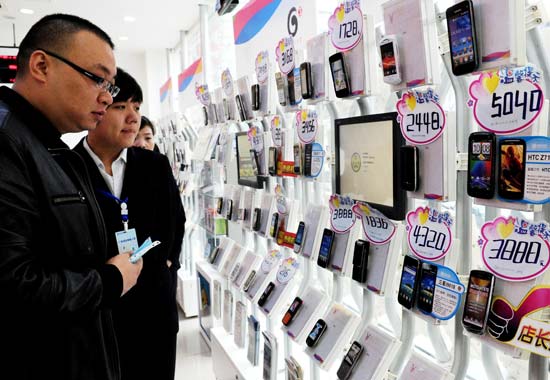

|
 |
|
Smartphones on display at a China Mobile Ltd store in Zhengzhou, Henan province. Smartphone shipments in China are expected to outpace those of feature phones in the country next year, according to the research firm International Data Corp. [Photo/China Daily] |
Smartphone makers target consumers seeking low-cost, feature-rich options
When Chen Xiao, a sophomore student at Peking University, started looking for a suitable mobile phone, she quickly became overwhelmed in a marketing blitz of offers, tariffs and brands.
She had hoped to get a smartphone for less than 1,500 yuan ($235), with as many functions as possible. She thought it would be easy.
"But it made me dizzy; there are so many choices in the market and some new phones seem to emerge overnight," she told China Daily.
One analyst recently described the Chinese smartphone market as a "battlefield with brutal competition".
In addition to traditional mobile phone giants, such as Samsung Electronic Co Ltd and Motorola Mobility Inc, telecom equipment manufacturers, home appliance vendors and Internet companies have all jumped on the smartphone bandwagon.
The latest example could be Shanda Interactive Entertainment Ltd, which has just released its first Bambook Phone whose price starts at 1,299 yuan ($204).
Powered by ST-Ericsson's NovaThor U8500, the Bambook has a dual-core 1GHz processor and supports data transmission rates up to 14.4 Mbps.
Moreover, Shanda has equipped the device with self-developed games and pushes its online bookstore service to its users.
"We hope to launch a highly-capable smartphone model that more than 80 percent of Chinese mobile phone users can afford," said Tom Guo, chief executive of Shanghai Nut Shell Electronics Ltd, a mobile phone subsidiary of Shanda.
On the same day as Shanda's Bambook launch, the Chinese e-commerce giant Alibaba Group Holding Ltd teamed up with the home appliance maker Haier Group to introduce a new phone based on its self-developed Aliyun operating system.
The new device, priced at 999 yuan, will hit the market this month.
Alibaba unveiled its first Aliyun smartphone with the handset maker Tianyu Communication Equipment Co last July.
Wang Jian, Alibaba's chief architect, said a new mobile phone running on the Aliyun operating system will be released every three months in the future.
Meanwhile, China's biggest Internet company, Tencent Holdings Ltd, has launched six smartphone models, mainly targeting students.
And Baidu Inc, the search engine giant, has introduced two smartphones of its own that run on its self-developed mobile operating system.
"The huge volume of China's smartphone market naturally attracts various players," said Xiang Ligang, a Beijing-based telecom expert.
Smartphone shipments in China are expected to outpace those of feature phones in the country next year, according to the research firm International Data Corp.
In 2012, IDC estimated that out of the more than 280 million mobile phone shipments in total, features phones will only outnumber smartphones by 8 million.
New mobile phone players, including Xiaomi, Shanda and Qihoo 360 Technology Co, do not expect to make profit by selling hardware.
"They dreamed of copying the success of Apple to make money from providing software and various applications," explained Wang Ying, an analyst with the Beijing-based research firm Analysys International.
"However, I don't think they can achieve similar success, since Apple's iOS and eco-system are so hard to replicate," he added.
Smartphone chipset makers, including Qualcomm Inc and ST-Ericsson, have also stepped up their pace in strengthening their market positions in China.
Marc Cetto, senior vice-president of smart tablet solutions for ST-Ericsson, said China is quite simply a market no one can afford to ignore and ST-Ericsson will try to provide smartphone products that cost between 1,000 to 2,000 yuan - the range with the largest user base in China, he said.
Contact the writers at [email protected] and [email protected]
 The highs and lows of a stock market investor
The highs and lows of a stock market investor
 Robot 'Kuka' performs during 19th Robocup in China
Robot 'Kuka' performs during 19th Robocup in China
 Top 10 best-paid H-share listed CEOs
Top 10 best-paid H-share listed CEOs
 Man overcomes disabilities to build thriving business
Man overcomes disabilities to build thriving business
 Top 10 smartphone brands that lead China Mobile's 4G business in Jan-May
Top 10 smartphone brands that lead China Mobile's 4G business in Jan-May
 Identifying counterfeit money
Identifying counterfeit money
 Top 10 services changed by O2O
Top 10 services changed by O2O
 The dying of craft of repairing pans
The dying of craft of repairing pans